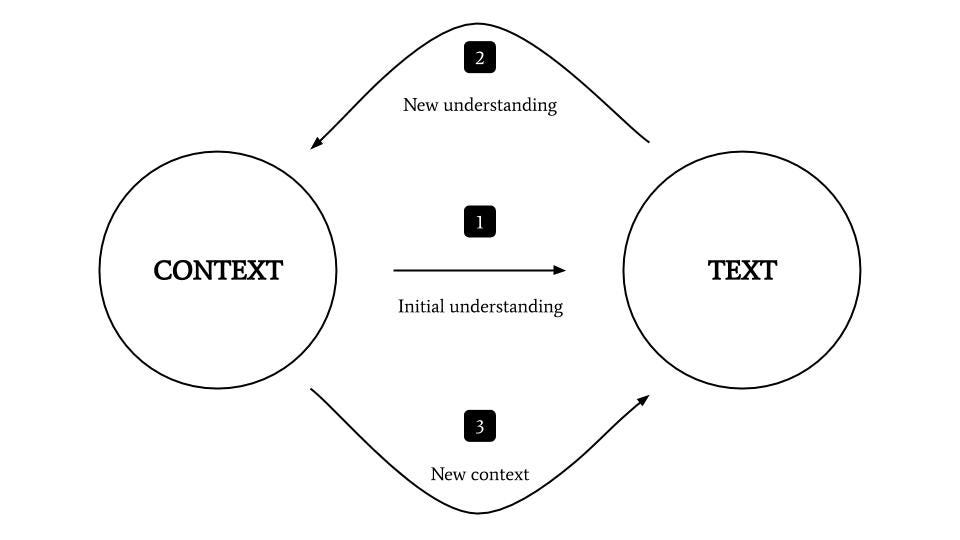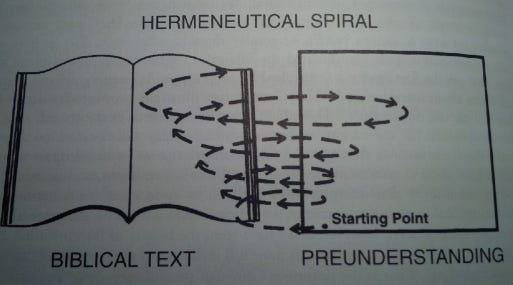Let's Look At The Text
Internalizing and Applying The Word Of God
To interpret the Bible, you must read the Bible. To read the Bible, you must learn to read. The most formidable barrier to understanding the Bible is the ability to read.
I only learned to read in seminary. Before then, I skimmed. Or, I searched texts for answers to school questions. Or, I thought primarily of myself and what the words were saying to me, rather than what the text was saying. Big difference.
It’s hard to read.
For example, when I tell you, “I have the love of God,” what do you think I mean?
Does it mean I am the one who loves God? As in, my love is towards God?
Does it mean that I have received love from God? As in, God’s love has been given to me?
Most of us have been trained, thanks in part to the internet, to skim. We see blocks of text and instinctively grow impatient. We struggle to read physical books because we’ve grown accustomed to the sensation of progress that comes with the mouse wheel or thumb flick.
In school, we read not for understanding but for an answer — mistaking the means for an end. This was enough to get the grade but it is not enough for a maturing Christian who is called by Jesus to love with their mind. And reading well is just that: love.
Many misunderstand Paul because they do not care to love Paul, put themselves in his sandals, and seek to understand him the way he wants to be understood. Reading, in its purest form, is an act of love, an act of attentive listening.
People commonly describe three steps in Bible engagement: 1) Observation, 2) Interpretation, and 3) Application. I believe the greatest error occurs when people skip the first step.
Sönke Ahrens, in his book How to Take Smart Notes, describes reaching proper understanding through a hermeneutic circle. The reader ought to understand a text in its context. Their understanding must be developed to get closer and closer to understanding what the text is saying.

This concept is similar to a concept I learned in seminary: the hermeneutic spiral. The interpreter does not merely go around in circles. The goal is to keep going back to the text to gain a deeper understanding of its meaning.
In my previous post about ethics, I defined a “vibe” as gut instincts comprised of all experiences, feelings, and beliefs up until that point. A Christian needs to attentively read, re-read, and embody the teachings of Scripture such that they develop biblical gut instincts. In other words, biblical thinking becomes a kind of vibe.
When people get off track in Bible studies, say, “Let’s look at the text.”
When people are discussing matters of ethics or doctrine, say, “Let’s look at the text.”
When helping your kids understand something important say, “Let’s look at the text.”
Do not skip observation. Repeat the text. Internalize it. Adore it. Love the Author and develop your soul.
Links I Liked
Some people avoid the chaos of social media algorithms and read Christian blogs, substacks, and websites by direct RSS feeds. I’ve written before on how to do that. This “links I liked” section will include the best links I’ve shared on Twitter/X in the past week.
Meta, AI Chatbots, and The Future Of The Internet | WWJT
The latest episode of my podcast is a good one. After being laughed off in 2022, the idea of the metaverse is coming back thanks to improvements in AR, VR, and AI. Not only that, but some new chatbots on Snapchat, Facebook, and Instagram are concerning. A new friend of mine, Ian Harber, joined us for this episode.
Introducing the ‘Post-Christianity?’ Podcast | TGC
With co-hosts Glen Scrivener and Andrew Wilson, this has become a new must-listen podcast for me. It just came out this week.
The West is increasingly described as “post-Christian.” But is that label accurate? Are contemporary people leaving Christianity behind completely? Or are they adopting some of its values while rejecting others?
Retirement: The New Afterlife? | Gentle Reformation
Indeed, the precariousness of life in The Villages is the elephant in the room. There are no cemeteries. The ambulances and hearses are unmarked. ‘Nobody talks about the fact that every few weeks, a vaguely familiar face vanishes from the pickleball court’.
Anti-Wokeness and the Evangelical Fracturing | Mere Orthodoxy
If you want to understand liberalism, as well as a growing theological movement that retrieves church history, read this. Jake Meador, the author, consistently offers insight into understanding culture and how to live in the culture. A rare combination.
Tracing Christianity’s Impact on Slavery through the Centuries | Crossway
Martin Niemöller (1892–1984), a Lutheran pastor in Germany, was imprisoned between 1938 and 1945 for his opposition to the Nazi regime. On one occasion, when interrogated by Hitler himself, Niemöller responded, “You can imprison me and you can torture me and you can kill me, but . . . one day you will give an account to one who is the King of kings and the Lord of lords.”19 Justice may not always be done in this life. But there will be a judgment, and justice will be done.



